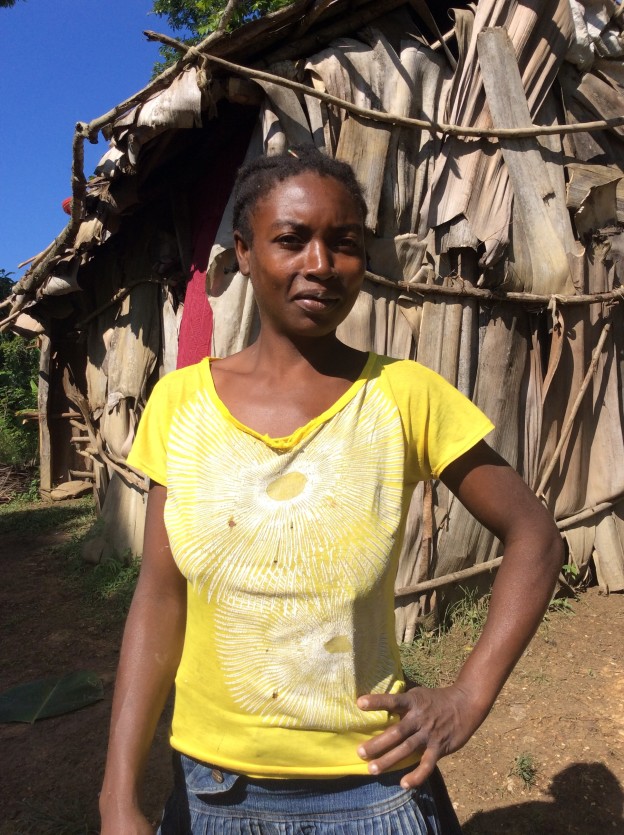Jeanne Brise lives with her partner, Chilet, and four of their six children in Bwa Kabrit, a quiet area that’s hidden among trees just off the main road leading into downtown Lascahobas. She’s been a CLM member for a little more than a month.
She went through the selection process in January. When we select families for a new cohort, we try to visit all the families in a community or a group of communities who might qualify for the program. But then we run up against the reality that underlies the way our operation functions. We receive funds for a certain number of families, so if the area we are preparing to work in yields more families than that number, some families will have to wait. We could just stop selecting when we got to the number we can serve, but that would bring another problem with it. Accurate selection is extremely difficult in a community where we are already working. Jeanne was one of the unlucky ones. We weren’t able to start working with her until June.
At the time we selected her, our choice might have looked surprising. Her selection form lists the couple as owning two goats and a pig, much more wealth than an entering family would normally have. But those assets were only part of the picture.
They were living in a miserable house of straw and leaves on land that they didn’t own, or even rent. They are not from Bwa Kabrit. They’re from Koray Gran, a community in Savanette, the commune south of Lascahobas. They left home because they could see no future there. They couldn’t earn anything like a living. Chilet had found some day labor working in fields near Bwa Kabrit, so he brought the rest of the family over. A landowner permitted them to set up a small shack on his land. But since they had no access to any land of their own, they could not farm. Their children weren’t in school, and they couldn’t feed them every day.
They would work in the neighbors’ fields when they could find someone who needed them, and Jeanne would do laundry for wealthier families. Their hard work brought some progress. They used Jeanne’s laundry earnings to buy the livestock.
But our selection team did not think it would be enough to establish a life. Here is what Wesnel Charles, the manager who verified their selection, wrote in his notes:
“None of their four children go to school because they don’t have the means to send them . . .. The children are really filthy. You see their poverty vividly. The mother’s the same way. She says that they have to struggle with hunger all the time. If it wasn’t for her laundry money, they’d just die. Supposing they were able to sell their two goats for 3000 gourds [now about $50], they could use the money to rent a piece of land to live on. Then they could sell the pig to buy some of the lumber they would need to build a house. But their shack has nothing in it but the sticks they sleep on and the few dirty rags they wear.”
He’s arguing that even the assets they had were not enough to help them move forward. And he turned out to be right. By the time they joined the program, they had nothing, even though they were still in the same shack. Nothing of Wesnel’s construction plan came to fruition.
First the pig died. When it was clear that it had contracted Teschen Disease, an incurable viral infection fatal in about 85% of cases, they sold it to a butcher for 1750 gourds, much less than it had been worth just a week earlier, when it still appeared healthy. But the low price isn’t the worst of it. When butchers buy a sick or dead animal, they don’t pay cash. They don’t need to. They know that the seller is over a barrel. So the butcher owes Jeanne and Chilet the money. She said she would pay in July, but July is almost over, and they haven’t been able to collect yet.
The two goats turned out to be only one goat. We’re not sure how the misunderstanding occurred, but Jeanne now insists that she only had one. When Chilet’s brother was facing a sudden expense, he asked to borrow it. That’s to say that he sold to get the money he needed, promising to replace it in August.
Suddenly the couple’s assets were at zero. And the landowner who had given them permission to set up their shack on his land decided he wanted his land back.
So by the time the couple joined the program, they seemed well qualified: no assets except some money owed to them, children who are hungry and not in school, and a miserable little shack that they would not even be able to stay in much longer. Whether Wesnel’s decision was correct at the time he made it is a separate question, but events seem to have born out his reasoning.
The couple now has a lot of work to do. They found a small plot of land to rent, and their case manager, Sandra, help them convince the land’s owner to let them owe him the money. She made sure he knew that she would be taking responsibility for helping them save up the money that they owe him. Now they’ve begun to prepare their move. They are going to have to be very careful with money. They owe the rent, they will have some construction materials to buy beyond what the CLM program offers, and they want to send their two older kids to school this year.
